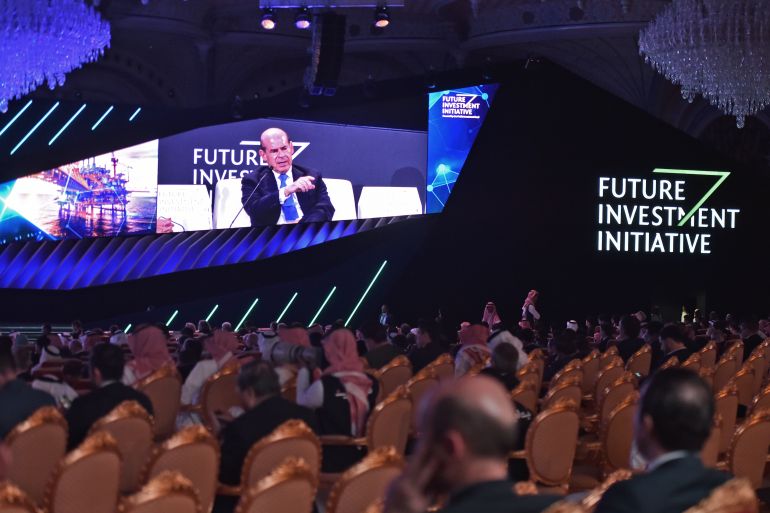Saudi Arabia’s ‘Davos of the Desert’ awaits new US policy
Kingdom’s highly anticipated Future Investment Initiative to go online amid ongoing pandemic.

Saudi Arabia, the Arab world’s largest economy, is scheduled to hold its annual Future Investment Initiative (FII) amid the ongoing coronavirus pandemic and a new US administration said to be reluctant to cede to the kingdom’s strategic imperatives.
The conference, starting on Wednesday and dubbed Davos in the Desert, will see a plethora of government officials and top CEOs – from industries ranging from finance and pharmaceuticals to entertainment – partake.
Keep reading
list of 4 itemsTurkey, Saudi Arabia eye improved ties after Gulf crisis ends
Saudi Red Sea project plans 16 hotels by 2023 to boost tourism
Saudi Arabia: Time to face the music
“The 4th edition of FII will see the most innovative technologies to facilitate global conversations and to be inclusive at the benefit of all of humanity,” Richard Attias, the FII Institute’s CEO, said earlier this month.
“The FII institute will act as a catalyst and a pioneer to allow interaction and exchange of disruptive ideas. There has never been a more important time to bring the greatest minds together to harness this opportunity to reimagine our world.”
Vision 2030
Saudi Crown Prince Mohammed bin Salman (MBS) announced in 2016 the country was building up its public investment fund to become a significant player in global markets, and unveiled a broad-based economic reform plan, known as Vision 2030, revealing how the oil-reliant state plans to diversify its economy over the next 14 years.
Saudi Arabia announced its intention to sell shares in state oil giant Aramco and set up the world’s largest wealth fund in line with the plan. MBS’s ambitious targets envisaged increasing the private sector’s contribution to gross domestic product (GDP) from 40 percent to 65 percent.
A main aspect of the vision was the development of a vast new $500bn high-tech economic zone on the Red Sea called Neom – an area close to the size of Belgium.
Biden criticism
Observers see the high-profile conference as a way for the kingdom to redeem itself in the eyes of US President Joe Biden and the wider international community.
Previous summits were marred by the killing of Saudi journalist Jamal Khashoggi in the kingdom’s consulate in Istanbul by what Saudi authorities described as a “rogue” government hit squad.
The assassination prompted an exodus of CEOs, with many announcing their outright refusal to attend the meeting or send junior delegations instead.
Another potential obstacle to conference’s successful denouement, according to analysts, is Biden’s disdain for some of the kingdom’s policies in the region, including its war in Yemen and the recently ended blockade against tiny Gulf neighbour Qatar.
Riyadh headed an Arab-led coalition in 2015 after Houthi rebels in Yemen overtook the capital Sanaa from the internationally recognised government of President Abd-Rabbu Mansour Hadi.
The war has since led to what the United Nations described as the world’s worst humanitarian crisis, with 80 percent of the country’s 24 million people in need of humanitarian assistance.
“Under a Biden-Harris administration, we will reassess our relationship with the kingdom, end US support for Saudi Arabia’s war in Yemen, and make sure America does not check its value at the door to sell arms or buy oil,” Biden said on the campaign trail before November’s US election.
Riyadh, however, is said to have won back some of the goodwill by ending its blockade on Qatar, which it imposed in June 2017 after accusing Doha of supporting “terrorism” and backing its arch foe Iran – accusations Qatar consistently denied.
This year’s conference, which will include 140 speakers, will be livestreamed because of the coronavirus pandemic. The last edition of the meeting, held in Riyadh in October 2019, witnessed the participation of more than 6,000 executives and officials.